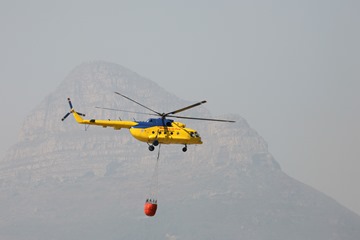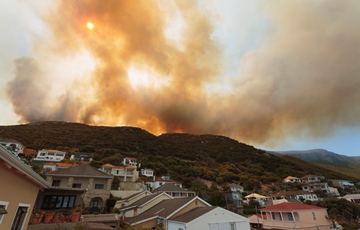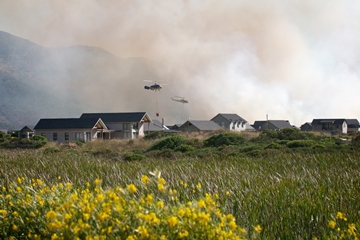Protect your home from natural disasters
 Losing your home in a natural disaster is devastating. After the disaster, the next few months will be even more difficult. Therefore it's important to take preventative measures to ensure that there's limited damage to you and your property.
Losing your home in a natural disaster is devastating. After the disaster, the next few months will be even more difficult. Therefore it's important to take preventative measures to ensure that there's limited damage to you and your property.
Over the years, the Western Cape has been hit with a number of natural disasters which include:
- The 1981 Laingsburg floods.
- The Cape Town fires in 2015.
- The Knysna fires in 2017.
We don’t know when the next natural disaster will occur, so it's important to take preventative steps to make sure that your family is safe and that there’s limited damage to your property.
Safeguard your home against fire damage
If you live in an area that's at high risk of wildfires, the City of Cape Town recommends you take the following precautions to keep your home safe:
- Build firebreaks around your property. Placing gravel or a well maintained lawn around your home will certainly help.
- Remove flammable debris like dead leaves, twigs or litter from your premises.
- Remove dead branches from trees and bushes.
- Keep a fire extinguisher in your house.
- Have your garden hose rolled up and ready for use in case there is a fire.
- Consider installing screens, shutters or heavy fire-resistant curtains.
- Store any firewood, gas, petrol or paint away from living areas.
- Provide enough distance between different buildings to allow for emergency access.
- Where possible, have more than one exit from your home.
- Have an escape plan and make sure that the whole family understands your plan.
- Make sure street fire hydrants are easy to get to and not blocked by parked vehicles.
- Make sure there is easy access and turning space for emergency vehicles.
 Safeguard your home against flood damage
Safeguard your home against flood damage
If your property is at risk of flooding, take precautions and follow these measures:
- Have a first aid kit and include all necessary medication.
- Save emergency numbers on your cell phone.
- Contact your insurance company to make sure that natural disasters are covered.
- Teach your children to memorise your phone number in the correct order.
- Keep all your personal documents, credit cards and medical aid details in a waterproof bag.
- Pack dry clothing to keep warm.
- Have an emergency whistle to signal for help.
- Pack non-perishable foods, candles, water and matches.
- Safeguard your home by fixing cracks, pipes and clearing gutters.
- Raise your appliances off the ground.
- Seal your walls and open spaces, by adding other materials to keep the water out.
- Have a torch, battery radio and spare batteries.
- Switch off all electrical appliances.
- Tie down all moveable objects outside of your home.
Reporting disasters are the first step to ensuring your safety. Therefore it's important to report a wildfire, storm surge or possible flood immediately, even if it's a small one, and to keep monitoring the situation.
If you have to leave, make sure that you're wearing protective clothing, contact your municipality immediately and don't leave your pets behind.
We also recommend that you follow these steps when evacuating a flood or fire.
Why is home insurance important?
Getting home insurance covers more than just the roof over your head. Repairs are usually costly, and since emergencies are sudden and unexpected, you might not have the financial resources to pay for the repair damaged structures immediately. Insurance usually covers the repair costs of your home should it get damaged during an emergency. The cover also usually extends to the contents in your home and not just the physical. Speak to a financial advisor regarding the best insurance for you.
 When your home has been damaged
When your home has been damaged
During an emergency, public safety officials use a combination of methods to keep the public informed:
- Local government public information officers can prepare and distribute press releases for broadcast by local media outlets.
- Public safety officials can directly broadcast messages over radio channels.
- First responders and credentialed volunteers can go door-to-door to alert citizens.
- If applicable, the local SMS notification system (municipal text messaging system) can be used to notify affected residents.
There's no guarantee that every citizen will be contacted, but these methods allow regional officials to quickly notify large sections of the local population.
The Western Cape Government’s Disaster Management will coordinate and facilitate efforts to best help you during the emergency. The Provincial Disaster Management Centre will inform the Department of Social Development, Provincial Human Settlement and the South African Social Security Agency (SASSA) to give social relief support to the citizens.
If you own a private residence and it is damaged during a natural disaster, please contact your insurance company immediately.
However, if you live in government housing or an informal dwelling, please alert the municipality where you live and contact the Provincial Department of Human Settlements. Your local municipality will help with starter fire kits and provide aid after the disaster. You should also contact the Provincial Department of Human settlement for help.
Other non-governmental organisations (NGOs) such as Gift of the Givers and the Red Cross can also help you during an emergency.
Municipality contact details
|
MUNICIPALITY |
CONTACT NUMBER |
WEBSITE |
|
City of Cape Town |
Tel: 086 010 3089 |
|
|
Cape Winelands District Municipality |
Tel: 086 126 5263 |
|
|
Breede Valley |
Tel: 023 348 4994 /6 |
|
|
Drakenstein |
Tel: 021 807 4500 |
|
|
Langeberg |
Tel: 023 615 8000 |
|
|
Stellenbosch |
Tel: 021 808 8111; 021 808 8890 (24/7 Emergencies) |
|
|
Witzenberg |
Tel: 023 316 8201 |
|
|
Central Karoo District Municipality |
Tel: 023 449 1000 |
|
|
Beaufort West |
Tel: 023 414 8100 |
|
|
Laingsburg |
Tel: 023 551 1019 |
|
|
Prince Albert |
Tel: 023 541 1036 |
|
|
Garden Route District Municipality |
Tel: 044 803 1335 |
|
|
Bitou |
Tel: 044 501 3024 |
|
|
George |
Tel: 044 801 9069 |
|
|
Hessequa |
Tel: 028 713 8038 |
|
|
Kannaland |
Tel: 028 551 1023 |
|
|
Knysna |
Tel: 044 302 6380 |
|
|
Mosselbay |
Tel: 044 606 5000 |
|
|
Oudtshoorn |
Tel: 044 203 3003 |
|
|
Overberg District Municipality |
Tel: 028 425 1157 |
|
|
Cape Agulhas |
Tel: 028 425 1927 |
|
|
Overstrand |
Tel: 028 313 8080 |
|
|
Swellendam |
Tel: 028 514 1100 |
|
|
Theewaterskloof |
Tel: 028 214 3300 |
|
|
West Coast District Municipality |
Tel: 022 433 8425 |
|
|
Bergriver |
Tel: 022 913 1126 |
|
|
Cederberg |
Tel: 027 482 8030 |
|
|
Matzikama |
Tel: 027 201 3321 |
|
|
Saldanabay |
Tel: 022 701 7101 |
|
|
Swartland |
Tel: 022 487 9400 |


